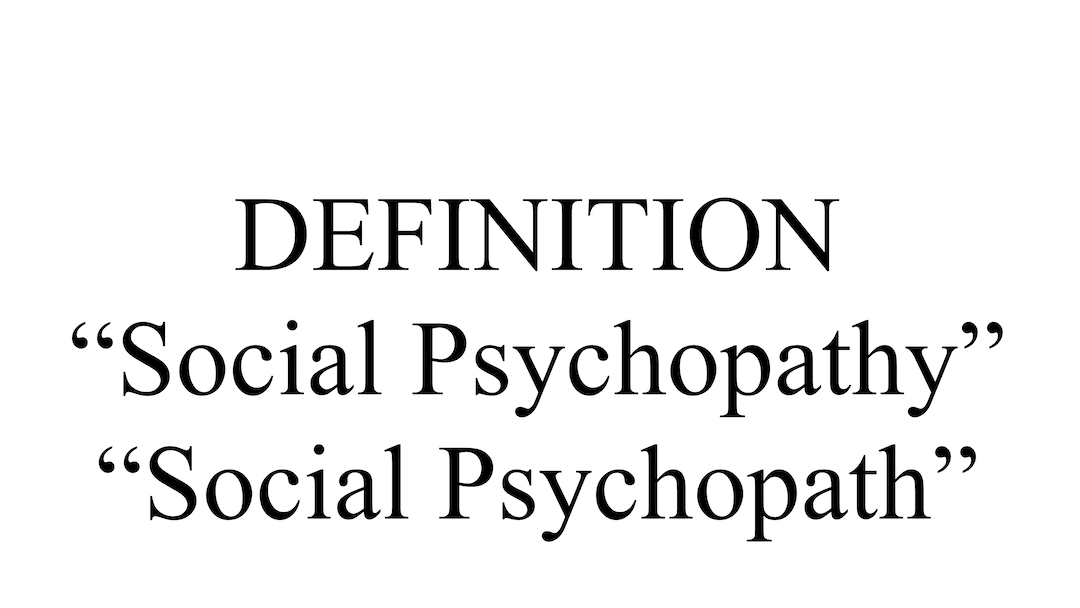New Moral Order™
SOCIAL PSYCHOPATHY
Definition of the term “Social Psychopathy” or “Social-Psychopathy”
Definition of the term “Social Psychopath” or “Social-Psychopath”
#SocialPsychopathy
#SocialPsycho
SOCIAL PSYCHOPATHY or SOCIAL-PSYCHOPATHY
SOCIAL PSYCHOPATH or SOCIAL-PSYCHOPATH
Noun.
[ soh-shuhl sahy-kop-uh-thee, soh-shuhl sahy-kuh-path ]
Summary Definition of “Social Psychopathy” and “Social Psychopath”
Social Psychopathy is the real-world definition of psychopathy. A Social Psychopath lacks all innate empathy.
Full Definition of “Social Psychopathy” and “Social Psychopath”
The Social Psychopath, aka ‘true psychopath’, more accurately defines this most serious of mental disorders, as quite simply being a total lack of all empathy, which in turn automatically, or generally, results in the formation of the numerous other traits that psychology may attribute to the generalised condition of ‘psychopathy’.
All other traits that are associated with the psychopath by traditional psycho-analysis theories on psychopathy, are in fact, just secondary symptoms of this central cause of ‘unempathy’, or at least require that central cause to exist in association with the secondary symptom, in order for a psychopathic personality to manifest itself.
This absolute lacking of an ability to experience empathic is innate in the Social Psychopath, meaning that it cannot be normalised. In other words, a Social Psychopath is psychopathic for life because he or she will never genuinely feel empathy, although they may become consummate experts at pretending to do so.
Many ‘sociopaths’ can also exhibit a total lack of empathy. The difference between the sociopath and the Social Psychopath is that the former is able to recover a true sense of empathy, and thereby also those positive social emotions that demand an underlying capability of empathy in order to be present, such as compassion, and cognitive thought (the natural ability in humans to experience the emotions that another individual is feeling, without having to personally experience them, aka to empathise). The Social Psychopath is able to mimic – through conditioning – this basic social standard, but is not able to be driven towards it be any innate sense or comprehension of morality. Therefore, the sociopath may be deemed to be ‘immoral’ but the Social Psychopath is ‘amoral’.
Social Psychopaths, which amount to around 1% to 3% of the general population, are likely to be highly dangerous to others unless they are positively conditioned during childhood, through being adequately programmed with moral standards. However, such positive social conditioning, alongside a total prohibition of Social Psychopaths holding any positions of power within society, may provide a social framework in which the Social Psychopath is not considered to be a clear and present danger to other individuals and to society as a whole.
It is more than fair to say that all wars and crimes against humanity, throughout history, have been at the hands of either Social Psychopaths, or sociopaths under their command. Once social policies are put in place to prevent the the Social Psychopath holding any position of political, economic or social power, 99% of all major social issues will see an immediate and dramatic decline, and people will suddenly realise who the one true enemy has been all along.
The Social Psychopath, aka ‘true psychopath’, more accurately defines this most serious of mental disorders, as quite simply being a total lack of all empathy, which in turn automatically, or generally, results in the formation of the numerous other traits that psychology may attribute to the generalised condition of ‘psychopathy’.
All other traits that are associated with the psychopath by traditional psycho-analysis theories on psychopathy, are in fact, just secondary symptoms of this central cause of ‘unempathy’, or at least require that central cause to exist in association with the secondary symptom, in order for a psychopathic personality to manifest itself.
This absolute lacking of an ability to experience empathic is innate in the Social Psychopath, meaning that it cannot be normalised. In other words, a Social Psychopath is psychopathic for life because he or she will never genuinely feel empathy, although they may become consummate experts at pretending to do so.
Many ‘sociopaths’ can also exhibit a total lack of empathy. The difference between the sociopath and the Social Psychopath is that the former is able to recover a true sense of empathy, and thereby also those positive social emotions that demand an underlying capability of empathy in order to be present, such as compassion, and cognitive thought (the natural ability in humans to experience the emotions that another individual is feeling, without having to personally experience them, aka to empathise). The Social Psychopath is able to mimic – through conditioning – this basic social standard, but is not able to be driven towards it be any innate sense or comprehension of morality. Therefore, the sociopath may be deemed to be ‘immoral’ but the Social Psychopath is ‘amoral’.
Social Psychopaths, which amount to around 1% to 3% of the general population, are likely to be highly dangerous to others unless they are positively conditioned during childhood, through being adequately programmed with moral standards. However, such positive social conditioning, alongside a total prohibition of Social Psychopaths holding any positions of power within society, may provide a social framework in which the Social Psychopath is not considered to be a clear and present danger to other individuals and to society as a whole.
It is more than fair to say that all wars and crimes against humanity, throughout history, have been at the hands of either Social Psychopaths, or sociopaths under their command. Once social policies are put in place to prevent the the Social Psychopath holding any position of political, economic or social power, 99% of all major social issues will see an immediate and dramatic decline, and people will suddenly realise who the one true enemy has been all along.
See more important new definitions
of words and terms for a better society
at the New Moral Order™ Lexicon.
